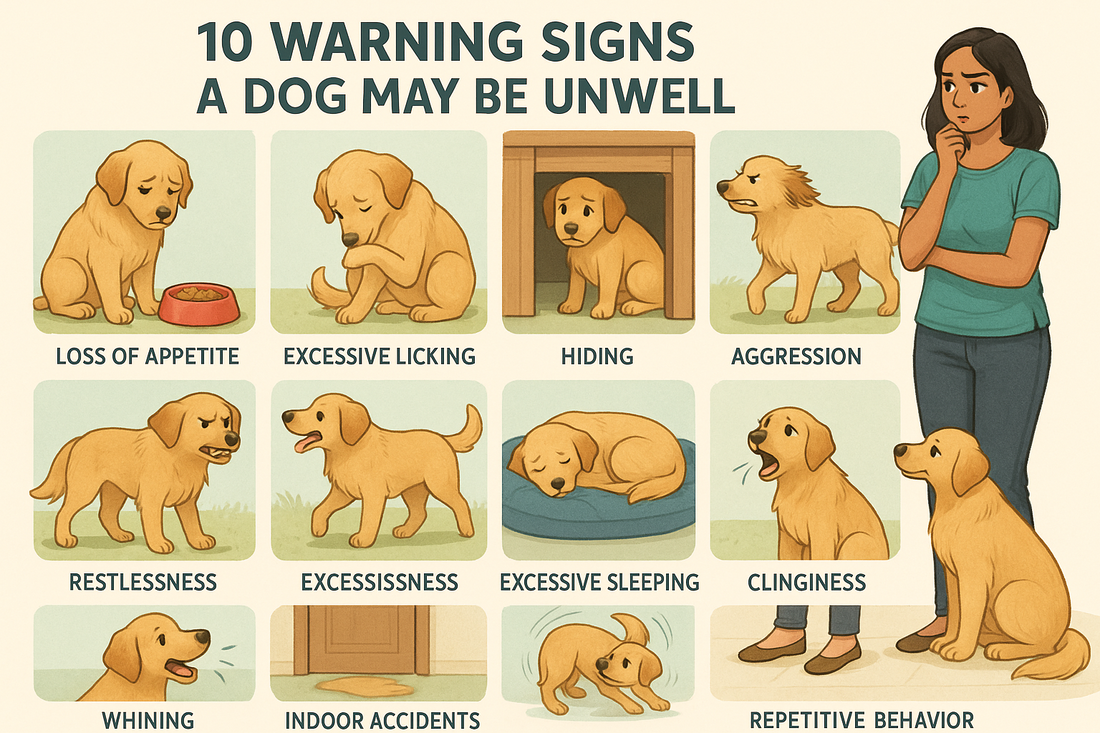
10 Warning Signs Your Dog Is Unwell – When to Call the Vet
Share
What To Watch For And When To Consult A Vet
As pet parents, we strive to understand our furry companions, but sometimes they can't verbally tell us when they're feeling under the weather. Dogs communicate through behavior and body language, and it's up to us to become fluent in their language. Here are ten signs that your dog might be trying to tell you something is wrong, along with practical advice to help you respond.
Behavioral Changes :
Subtle shifts in your dog's behavior can be early warning signs of underlying issues. Keep a close eye on these changes:
- Changes in Appetite: A sudden decrease or increase in appetite can indicate a health problem. If your dog skips meals or starts eating excessively, it's worth investigating.
- Excessive Licking: Obsessive licking of a particular area could indicate pain, allergies, or skin irritation. Pay attention to where your dog is focusing their attention.
- Hiding or Withdrawal: Dogs who are feeling unwell may hide or withdraw from social interaction. If your normally social dog suddenly becomes reclusive, it could be a sign of discomfort or fear.
- Unusual Aggression: A dog who is typically friendly and suddenly becomes aggressive may be experiencing pain or anxiety. Rule out medical causes before addressing behavioral issues.
- Restlessness or Pacing: Difficulty settling down or constant pacing can be a sign of anxiety, pain, or cognitive dysfunction, especially in older dogs.
- Changes in Sleep Patterns: Sleeping more or less than usual can indicate a health problem. If your dog is unusually lethargic or struggling to sleep, consult your vet.
- Vocalization Changes: Excessive barking, whining, or howling, especially when it's out of character, can be a sign of distress or pain.
- Accidents Indoors: If your house-trained dog suddenly starts having accidents indoors, it could indicate a urinary tract infection, digestive upset, or other medical issue.
- Repetitive Behaviors: Circling, tail chasing, or other repetitive behaviors can be signs of anxiety, obsessive-compulsive disorder, or neurological problems.
- Clinginess: Suddenly becoming overly attached and clingy can be a sign that your dog doesn't feel well or is anxious and seeks reassurance.
What To Do :
If you notice any of these signs in your dog, it's essential to take action. Start by observing your dog closely and documenting the specific behaviors you're seeing. Note when they occur, how often, and any potential triggers.
Contact your veterinarian. Describe the changes you've observed and ask for guidance. Your vet may recommend a physical exam, blood work, or other diagnostic tests to determine the cause of the problem. Early diagnosis and treatment can improve your dog's chances of a full recovery and prevent the condition from worsening.
Trust your instincts. You know your dog better than anyone else. If you feel like something is wrong, even if you can't pinpoint the exact issue, don't hesitate to seek veterinary care. It's always better to err on the side of caution when it comes to your dog's health.
Being attentive to your dog's behavior and physical condition is key to maintaining their well-being. By recognizing the subtle signs that something might be amiss, you can provide them with the care they need to live a happy and healthy life.
